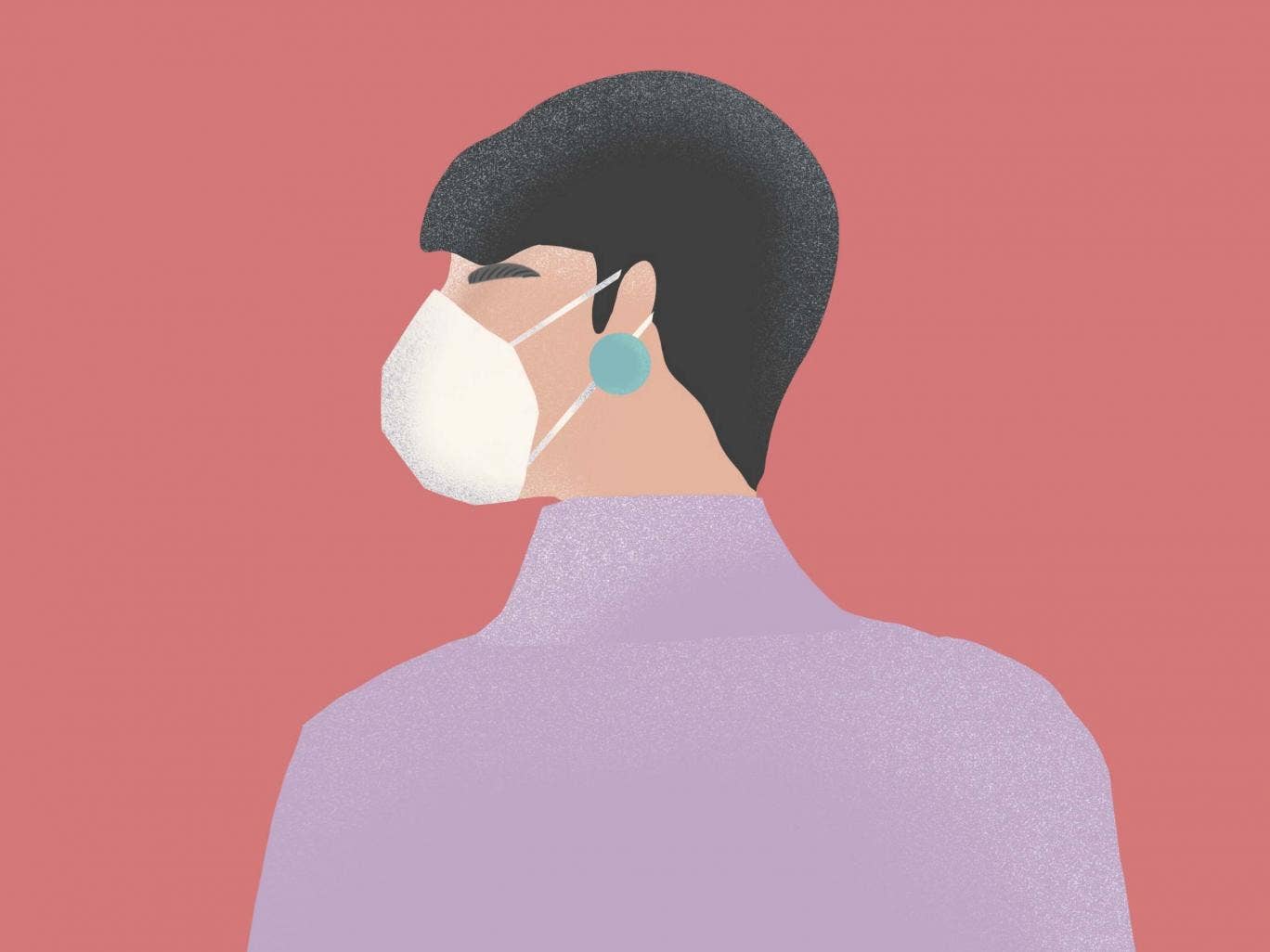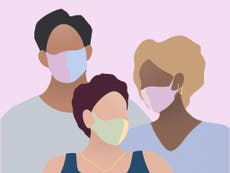Wearing a mask has given me a break from my crippling insecurity
Since starting to wear a face covering during the coronvirus pandemic, I've enjoyed the freedom of not wondering what people are thinking about my appearance, writes Christina Wyman

Your support helps us to tell the story
From reproductive rights to climate change to Big Tech, The Independent is on the ground when the story is developing. Whether it's investigating the financials of Elon Musk's pro-Trump PAC or producing our latest documentary, 'The A Word', which shines a light on the American women fighting for reproductive rights, we know how important it is to parse out the facts from the messaging.
At such a critical moment in US history, we need reporters on the ground. Your donation allows us to keep sending journalists to speak to both sides of the story.
The Independent is trusted by Americans across the entire political spectrum. And unlike many other quality news outlets, we choose not to lock Americans out of our reporting and analysis with paywalls. We believe quality journalism should be available to everyone, paid for by those who can afford it.
Your support makes all the difference.I was born with a severe overbite and a deformed jaw – known as a class II malocclusion and skeletal imbalance, for those wanting to impress their dentist.
Since a mask requirement came into effect in Michigan, where I live, I've been given a break from the crippling insecurity that's been plaguing me for 30 years. I am 100 per cent in favour of wearing a mask to protect myself and others from the coronavirus. But I have to admit that, when wearing one in public, I thoroughly enjoy the freedom of not wondering what other people are thinking about the lower half of my face.
The first time I donned a mask to go to the grocery store, I wore pyjamas and black rain boots. I'd tied my naturally wild curls in a messy bun. In my mask and bed clothes, I felt more confident than if I'd applied make-up and squeezed into a fresh pair of skinny jeans.
Growing up, simple orthodontia was no match for my rogue teeth and jaw, or the pathological fixation that would follow me into adulthood.
Most women on my dad's side were cursed with jaw deformities and malformed teeth. I came from a long line of light-haired and heavy-set Irish-Catholics with large mouths set against disproportionately narrow faces.
My dad's aunt, a woman we lovingly called Aunt Puppy, had it the worst. Her front teeth jutted far out of her mouth and sat low over her bottom lip when she smiled. They were spaced apart to such an extent that I have to believe she'd heard a cruel jab or two about the ability to park a bus or train between them – the same jabs levelled at me as I was growing up.
When she died, I overheard my grandmother – her sister – talk about her experience of seeing Aunt Puppy in the casket for the first time. Allegedly, the embalmer did a bad job. “If not for her teeth, I wouldn't have recognised her,” my grandmother said. The embalmer tried to glue her lips shut for the viewing, but her teeth wouldn't let him: a last stand of sorts.
I was eight when it became clear that I'd inherited the family's skeletal deformity. My parents put me through a round of braces at 10. By then, my front teeth protruded from my mouth, exactly as Aunt Puppy's had. They were spaced apart and sat over my lower lip like pillars. All of my middle-school pictures were dominated by metal and teeth, and even now they're tough to look at. I'm reminded of how punishing adolescence can be for a kid having a bad hair day, let alone a comically deformed mouth draped in brackets.
I'd be lying if I said that the bullying I experienced wasn't life-altering. Had mask-wearing been a public health imperative then, I never would have taken it off.
My brand of skeletal discord has been emotionally and physically disabling at different times. If left untreated, it can cause teeth grinding, jaw spasms, cavities, sleep apnea and difficulties with chewing and digestion.
As a child, I was too self-conscious to talk or laugh spontaneously during face-to-face interactions. I busied myself with learning to conceal my inability to swallow comfortably, to chew or breathe with my mouth closed, or to speak without drooling or spraying.
I don't know the extent to which others noticed my difficulties, but I always assumed they had. Making friends was impossibly hard, and as I got older, I often declined invitations involving food. Or speaking.
The blessed day that my orthodontist removed my braces was right before high school. I was relieved to turn 14 without metal glued to my mouth, and besides, orthodontia was promised to right my skeletal wrongs. But my three-year relationship with my orthodontist's wire-tightening tools and dental wax would be no match for teeth determined to pave their own path.
Unlike a large swath of people in the United States, I've embraced wearing a mask, and I concede that some of my reasons for having done so are a reflection of my deep-rooted insecurities
By the time I turned 25, my runaway teeth and rogue jaws would resemble Aunt Puppy's all over again, and I'd be sitting in another orthodontist's chair; only this time, the bill was mine. I was angry, dismayed, and determined to beat my genetics into submission.
At 31, I visited a third orthodontist. That time, my teeth were straighter, but my jaw was in excruciating pain. I'd learn that I needed a maxillofacial surgeon to fully correct my malocclusion. Three years and one more round of braces later, both jaws would be surgically broken and realigned, held together by rubber bands, plates and screws.
I was on a liquid diet for over a month and lost too much weight. By then, I'd spent nearly $15,000 and almost one-third of my life actively trying to reshape the lower half of my face.
I balk when I read about people who undergo myriad elective procedures in the name of chasing perfection. As I catch myself considering a fourth round of braces, I wonder whether I'm any different. I hide behind my PPE during trips outside, and I think of Aunt Puppy. I remember her teeth and her laugh. Boy, did she roar when she found something funny, her teeth and mouth on full display, a part of the package that was her.
Last year, at my small makeshift wedding, my new mother-in-law welcomed me into her family. She announced to our guests the first thing she noticed about me.
“She has the best laugh!” she'd said, her eyes twinkling. I had inherited more of Aunt Puppy than I knew.
Since my jaw-restructuring surgery, eating remains uncomfortable, and I still have a significant overbite. My lips won't close naturally - not without effort. I still loathe my smile and curse the genes that gave it to me.
On particularly vulnerable days, I worry about my mouth returning to its former unbearable shape. I press my husband for his assessment.
“Does my mouth still look like it did when we met?” I ask.
“Huh?” he looks blankly at me.
“You know, my mouth. My jaws. My teeth.”
“You look exactly as you did when we met,” he kisses me and admits that he has no idea what I'm talking about.
Unlike a large swath of people in the United States, I've embraced wearing a mask, and I concede that some of my reasons for having done so are a reflection of my deep-rooted insecurities. I'm just grateful for a spouse who has no idea what I'm going on about when I take it off.
Christina Wyman is an instructor at Michigan State University. She is working on a children's book.
© The Washington Post




Join our commenting forum
Join thought-provoking conversations, follow other Independent readers and see their replies
Comments